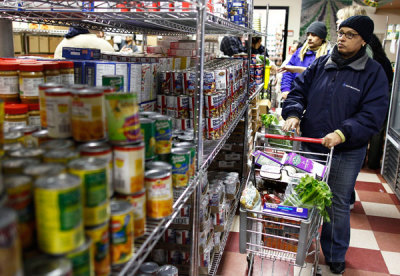Should Christians Support Food Stamps Cuts? Depends on Who You Ask

Christian advocacy groups are at odds over whether a 10 year, $39 billion cut to food stamps that the House of Representatives passed earlier this week would improve the livelihood of America's poor.
Rev. Gary Cook, the Director of Church Relations at Christian anti-hunger advocacy group, Bread for the World, has told The Christian Post that he is worried that the latest cuts could further marginalize the most vulnerable, rather than mobilize people back to work.
Cook explained that the cuts would cut off able-bodied adult Americans without dependents who had been receiving food stamps, even though they were not working.
Currently, these individuals can qualify for food stamps "if governors discover that there really aren't any jobs or there aren't any job training spots for people to get into." States then can apply for an exemption that would allow these individuals to still receive foods stamps, explained Cook.
"The people who take advantage of this are some of the poorest of the poor people in the country," Cook told CP. "Their average annual income is $2200 a person. They are among the most difficult to employee. If the government says our economy works well, when we have five or six percent unemployment, because that's our policy, at least they can eat."
But according to Ken Blackwell, who is the Senior Fellow for Family Empowerment at the conservative Christian lobbying group, Family Research Council, programs like food stamps prevented people from being truly empowered.
"I think through empowering others and creating self-sufficiency…there within lies the path to sense of worthiness," Blackwell told CP. "When I was growing up, there was fundamental belief, that there were times in people's life when they needed a hand up…there were temporariness to hose programs, where they were structured so that they didn't breed so that they didn't breed dependency."
Blackwell also suggested that there was "nothing more Christian" than "not locking people into a permanent dependency on government handouts, but making sure they are participants in their own upliftment and empowerment so that they in fact through the dignity of work and can break from the plantation of big government."
For Cook, though, providing food stamps for the poor had strong Biblical support.
"In the whole kind of Biblical frame, God made three provisions for hungry people," said Cook. "One was the tithe, which was literally a tax, because the government was the same as the religious order, and allowed widows and orphans to eat."
"The second provision was that there would always be Sabbath and jubilee, where every seven years and 50 years, there was land redistribution. This provision was to prevent class of people that were currently hungry," Cook added.
The last, Cook said, was gleaning — where corners of the field were deliberately not harvested so poorer members of the community could gather the remainder and use it to feed themselves.
"Here, hungry people have access to food as a matter of right, not as a matter of charity," said Cook, attempting to bring the connection back to contemporary American context.
In contrast, Blackwell argued that charity, not policy, would be the driver that kept the poor fed.
"America is such a compassionate nation, nothing in history that suggests that churches and communities and our families would let people die of hunger, there is absolutely nothing," said Blackwell.
"We are not lacking in churches in church communities across this nation in making sure that basic human needs are met without creating another government program that establishes rules that have very low expectations for self-discipline," said Blackwell. "I think we should have an honest debate and discussion in the church community…[on a host of social issues] Christians have been in the forefront, without government prodding or dominance."
Cook's biggest worry though, was that the food stamp cuts would offset the thousands of hours and dollars that these very church ministries spend annually supporting their communities through soup kitchens, bread lines, and food pantries.
"What churches do in terms of the kind of generous giving to poor, hungry people is amazing," said Cook. "But their work is worth $4 billion dollars annually, which is essentially equal to the annual cut Congress is proposing in food stamps."





















